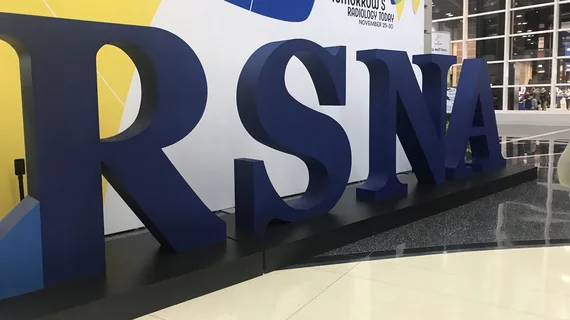Canon Medical pulling out of RSNA 2021 and other in-person meetings due to COVID-19
Canon Medical is pulling out of the Radiological Society of North America’s annual meeting and other in-person U.S. conferences due to ongoing COVID-19 concerns, leaders announced Wednesday.
The Japan-based imaging giant is also opting not to attend the American Society for Radiation Oncology’s show, slated for Oct. 24-27. Canon, however, is enhancing its virtual offerings at both Chicago gatherings to deliver a “stand-out experience.”
In explaining the decision, Canon cited its management philosophy, prioritizing the health and safety of patients and providers.
“We have included an assessment of the current rapid spread of the COVID-19 delta variant, its effect on hospitalization rates and the associated incidence of breakthrough cases in formulating our business decisions,” Toshio Takiguchi, president and CEO of Canon Medical Systems, said Oct. 6. “We have also been listening to our customers from around the world and their many and varied concerns around this ongoing situation. And under the guidance of our ‘Made for Life’ principles — considering our social responsibility to protect customers and peers at McCormick Place and to ensure employees and their families’ safety — Canon Medical will be attending RSNA 2021 and ASTRO 2021 with a fully digital presence only.”
ASTRO, located in Arlington, Virginia, said it does not comment on specific exhibitors but acknowledged “unique circumstances” this year, particularly for international companies navigating travel restrictions.
“ASTRO is working closely with the city of Chicago and McCormick Place to follow or exceed CDC safety protocols and comply with all federal, state and city regulations,” a spokeswoman said.
Oak Brook, Illinois-based RSNA said Thursday that Canon is the only major exhibitor to cancel its physical booth. The society has signed up nearly 500 companies to occupy its more than 300,000 square-foot show floor and is still receiving inquiries. It’s also logged 2,800 new registrations in the past week alone, said Executive Director Mark Watson.
“The confidence our exhibitors have in us is a testament to the quality of the RSNA annual meeting program, the enthusiasm of our attendees to return to Chicago, and the strict health and safety protocols we have put in place,” he told Radiology Business. “Even as we are pleased to see COVID numbers continuing to trend downward in Chicago and travel restrictions being lifted, RSNA is committed to providing the safest possible meeting environment for our faculty, attendees and industry partners.”
Both groups are requiring proof of vaccination against COVID-19 to attend their meetings and mandating mask wearing. They plan to routinely clean surfaces, place hand sanitizer stations throughout the event space, socially distance seating, and allow for wider aisles in exhibit halls. The massive Chicago convention center has also upgraded its ventilation systems and protocols to ensure the “highest possible air quality,” organizers said.
RSNA 2021 is slated to kick off Nov. 28 running through Dec. 2.
Editor’s note: This story has been updated to include comments from RSNA.

